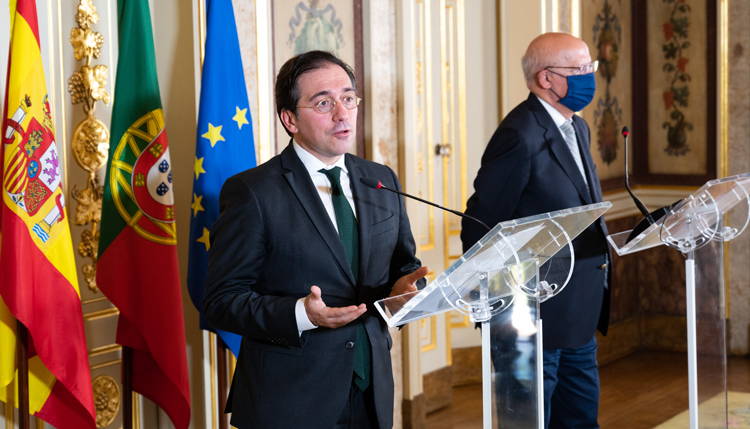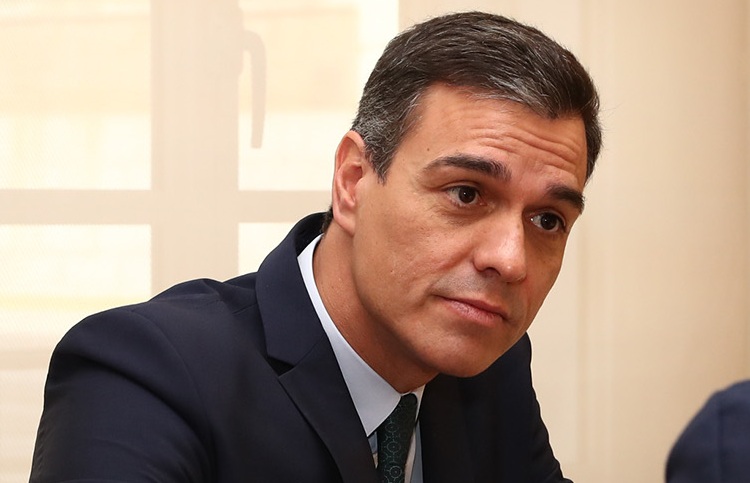The Diplomat
Spain and Portugal will discuss at the 32nd bilateral summit to be held in the Extremadura town of Trujillo next October the need to make progress on the railway interconnection between the two countries, the Spanish and Portuguese Foreign Ministers, José Manuel Albares and Augusto Santos Silva, said yesterday in Lisbon.
Albares travelled to Lisbon, in what was his first visit to an EU country, to meet his Portuguese counterpart, with whom he later appeared at a joint press conference. The Spanish minister said that bilateral relations are exceptional, of friendship, neighbourliness, history and culture, and that we share a double soul: we are Europeans and Ibero-Americans”.
The minister recalled that the 32nd Spanish-Portuguese Summit will take place in Trujillo in October, at which one of the central issues will be interconnections between the two countries, especially rail links, which are considered to be more environmentally sustainable.
The Spanish Foreign Affairs Minister indicated that infrastructures are a fundamental point for the development of Spain and Portugal and for the European Union, and that they should form part of a more ambitious plan that includes France and the rest of the EU countries.
For his part, Santos Silva pointed out that “the train is the future of connections, especially short- and medium-distance ones”. In this sense, he affirmed that the railway connection from the port of Sines, located 160 kilometres from Lisbon, is already underway, which will improve the speed towards Spain, both in the transport of goods and passengers. However, the project to link the capitals of Spain and Portugal by high-speed rail still does not have specific deadlines.
The summit, which will be preceded by a joint meeting of the Foreign and Defence Ministers of the two countries, will also serve, according to Albares, to establish the coordination of both countries in terms of Covid and the European economic recovery, as well as to deal with issues on the international agenda.
On the issue of vaccines, Minister Albares highlighted the good rate of vaccination in Spain and Portugal and stressed that nearly 60% of the Spanish population now has the full vaccination schedule. He therefore defended Spain as a safe country in which to travel, after the United Kingdom left Spain off its “green list”, which also includes Portugal.
When asked about a possible date for a trip to Rabat, in order to ease relations with Morocco, Albares, as he had said earlier that morning in Madrid, insisted that diplomacy requires “calm and time”, although this does not mean that “it is not a priority”.
“The trip to such an important country for Spain as Morocco, which is a friend and strategic partner of the first order, is fundamental, but also the second and third,” he said, adding that it is necessary to open paths to “build confidence and solidity” and that it is necessary for the trips to be something “recurrent and permanent”.
In the midst of the Spanish-Moroccan crisis, Morocco and Portugal are planning to open a maritime connection between Portimão, in the Portuguese Algarve, and the renovated port of Tangiers. Yesterday, Minister Santos was careful to point out to journalists that this connection is not intended to replace any other and explained: “We have worked with the Moroccan authorities at a technical level, but with the necessary prudence so that this connection can be made with all the public safety, whether for transport or health”.
Yesterday, before travelling to Lisbon, the Minister of Foreign Affairs attended the swearing in of two new directors general of his department. Hilda Jiménez, Director General of the Foreign Service; and Julio Pastor, Director General of Communication, Public Diplomacy and Networks.
Speaking at the ceremony, Albares asked Hilda Jiménez to strive to improve the lives of each and every person in the foreign service. As for Julio Pastor, he entrusted him with the task of trying to make people understand what the Ministry does and why it does it. He also referred to his background in the private sector, where he had been director of communications for several companies, and stressed the need to work hand in hand with Spanish companies abroad.







